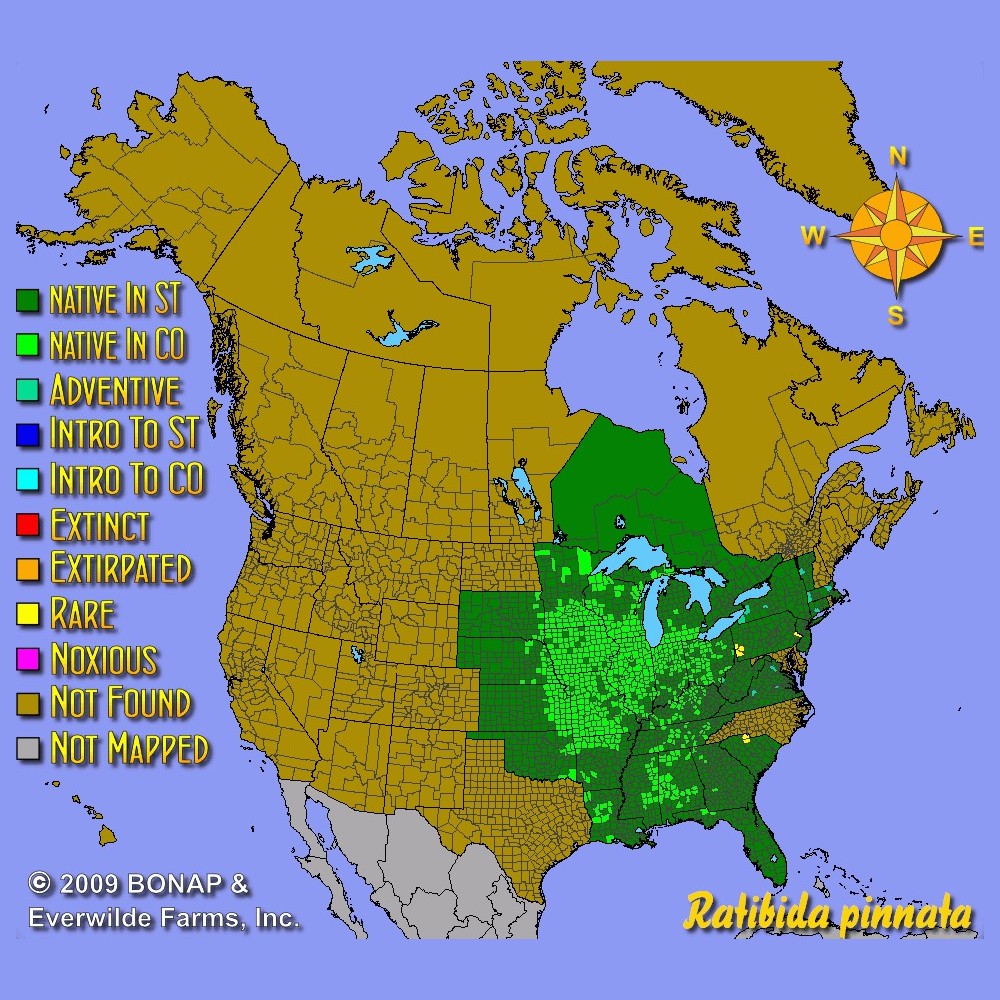Yellow Coneflower Seeds
- HOW TO GROW
- FAST FACTS
- REVIEWS
HOW TO GROW
Sowing: Direct sow in late fall, pressing into the surface of the soil. For spring planting, mix the Ratibida Pinnata seeds with moist sand and store in the refrigerator for 30 days before planting. Keep the soil lightly moist until germination, which usually takes 3-4 weeks. The yellow coneflower seeds can also be started indoors 8-10 weeks before planting in spring. Keep seedlings lightly moist, and transplant them as soon as they have developed several leaves.
Growing: Water seedlings regularly until they become established, and control weeds. When grown from seed, these plants usually begin blooming in their second year. Mature plants tolerate drought well and flourish in fairly dry soil, though they will benefit from occasional watering in dry weather. The blooming period tends to be longer with occasional watering. Mature plants can be divided every 2-3 years for healthy growth. This plant attracts butterflies and repels deer, as well as growing well in rocky, sandy, or clay soil. It makes an excellent choice for hot, dry areas.
Harvesting: For cut flowers, choose stems with flowers that have just opened. Strip the foliage that will fall below the water level, and place in water immediately.
Seed Saving: After the petals fall from the blossom, the cone will darken and develop ripe seed. As soon as the seed turns nearly black and can be rubbed loose from the cone, cut the ripe cones from the plant and spread them to dry. Thresh the plant material to separate the seed from the stems. Store the Ratibida Pinnata seeds in a cool, dry place.
FAST FACTS
Common Names: Gray-headed Coneflower, Pinnate Prairie Coneflower
Latin Name: Ratibida pinnata
Species Origin: US Native Wildflower
Type: Native Wildflowers
Life Cycle: Perennial
USDA Zones: 3, 4, 5, 6, 7, 8, 9
US Regions: Plains/Texas, Midwest, Northern, Northeast, Southeast
Seeds per Ounce: 27,600
Stratification: Cold/Wet for 4 Weeks
Germination Ease: Stratify 4 Weeks
Sunlight: Full Sun, Part Sun
Height: 60 Inches
Color: Yellow
Bloom Season: Blooms Late Summer, Blooms Early Fall
Uses: Attracts Pollinators, Attracts Butterflies, Cut Flowers, Deer Resistant
Very happy
The tansaction went smoothly and i recieved the seeds in a timely manner. These flowers will excellent editions to my garden.
DESCRIPTION

HOW TO GROW
Sowing: Direct sow in late fall, pressing into the surface of the soil. For spring planting, mix the Ratibida Pinnata seeds with moist sand and store in the refrigerator for 30 days before planting. Keep the soil lightly moist until germination, which usually takes 3-4 weeks. The yellow coneflower seeds can also be started indoors 8-10 weeks before planting in spring. Keep seedlings lightly moist, and transplant them as soon as they have developed several leaves.
Growing: Water seedlings regularly until they become established, and control weeds. When grown from seed, these plants usually begin blooming in their second year. Mature plants tolerate drought well and flourish in fairly dry soil, though they will benefit from occasional watering in dry weather. The blooming period tends to be longer with occasional watering. Mature plants can be divided every 2-3 years for healthy growth. This plant attracts butterflies and repels deer, as well as growing well in rocky, sandy, or clay soil. It makes an excellent choice for hot, dry areas.
Harvesting: For cut flowers, choose stems with flowers that have just opened. Strip the foliage that will fall below the water level, and place in water immediately.
Seed Saving: After the petals fall from the blossom, the cone will darken and develop ripe seed. As soon as the seed turns nearly black and can be rubbed loose from the cone, cut the ripe cones from the plant and spread them to dry. Thresh the plant material to separate the seed from the stems. Store the Ratibida Pinnata seeds in a cool, dry place.
FAST FACTS
Common Names: Gray-headed Coneflower, Pinnate Prairie Coneflower
Latin Name: Ratibida pinnata
Species Origin: US Native Wildflower
Type: Native Wildflowers
Life Cycle: Perennial
USDA Zones: 3, 4, 5, 6, 7, 8, 9
US Regions: Plains/Texas, Midwest, Northern, Northeast, Southeast
Seeds per Ounce: 27,600
Stratification: Cold/Wet for 4 Weeks
Germination Ease: Stratify 4 Weeks
Sunlight: Full Sun, Part Sun
Height: 60 Inches
Color: Yellow
Bloom Season: Blooms Late Summer, Blooms Early Fall
Uses: Attracts Pollinators, Attracts Butterflies, Cut Flowers, Deer Resistant
Reviews
Review
Very happy
The tansaction went smoothly and i recieved the seeds in a timely manner. These flowers will excellent editions to my garden.






